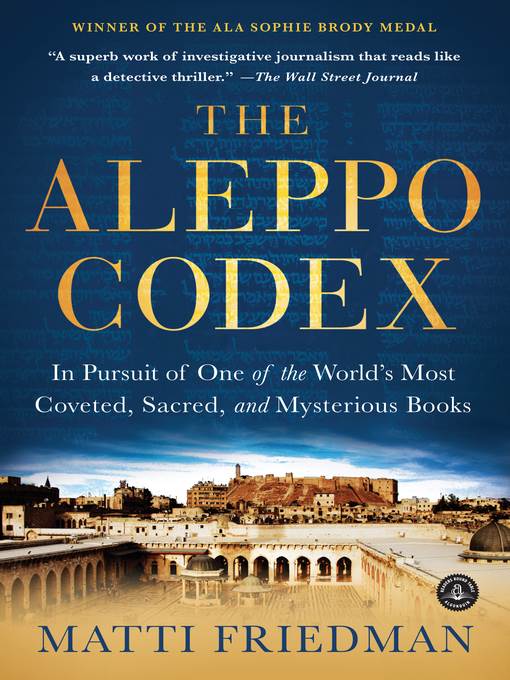
The Aleppo Codex
In Pursuit of One of the World's Most Coveted, Sacred, and Mysterious Books
کتاب های مرتبط
- اطلاعات
- نقد و بررسی
- دیدگاه کاربران
نقد و بررسی

Starred review from February 6, 2012
Friedman gives a masterful account of a major religious document, housed with the better known Dead Sea Scrolls in Jerusalem’s Shrine of the Book. The Aleppo Codex, a volume of parchment folios written in Tiberius circa 930 C.E., is considered the most accurate text of the Hebrew Bible. Stolen by Crusaders from a Jerusalem synagogue, the codex made its way to Egypt, was used by the great 12th-century scholar Maimonides and later brought to Aleppo, Syria, by a descendant of Maimonides. After being carefully kept in Aleppo’s Great Synagogue, the codex was damaged in 1947 by Arab rioters angered by the U.N. resolution to partition Palestine. Friedman plumbs two mysteries relating to the codex: how did it end up in the hands of Israeli authorities after being rescued from the Great Synagogue? And what happened to its missing pages (which caused a scandal when the government revealed their absence)? Facing missing court documents and the “conspiracy of silence” surrounding the codex, AP reporter Friedman sleuths out the answers, revealing a highly disturbing tale. Friedman delivers an atmospheric, tense story about the destruction of a sacred relic, raising inevitable questions about who owns a people’s historical treasures. Photos. Agent: Judy Heiblum, Sterling Lord Literistic.

March 15, 2012
A unique 1,000-year-old book is the pursued object of this scriptural detective story. Inscribed with precision on vellum in the 10th century, the book known as the Crown of Aleppo has been, over the centuries, the most authoritative version of the Hebrew Bible. Produced by a sect that owed fealty solely to the written Word, the Crown survived the Crusades in Jerusalem. In the outskirts of Cairo in the 12th century, it was studied by the great physician-philosopher Maimonides. It traveled eventually to Aleppo, Syria, where it was reverently safeguarded in a synagogue. That history is not disputed. But in 1947, when the establishment of the State of Israel was ratified by the UN, an anti-Semitic riot erupted and the Aleppo synagogue was torched and sacked. The sacred text was saved, hidden with a Muslim merchant, transported covertly to Turkey and eventually brought back to Jerusalem and the new Jewish nation. Nevertheless, it was not a happy ending. Only three-fifths of the Crown ended in the hands of the government caretakers. Absent was the Pentateuch, the Five Books of Moses. The dramatic story of the book and the search for the missing pages attracted a president of Israel, undercover agents, specialists and colorful and wealthy dealers in ancient texts. There were false trails, lies and deaths. The best theory: The central jewels of the Aleppo Crown were taken after it reached Jerusalem. After more than half a century, the pages have still not been recovered, but AP correspondent Friedman is fairly sure who took them, naming a learned, highly placed government official, a sage collector could not resist the remarkable text. As the author wryly concludes, the "page with the passage Thou shalt not steal was stolen. Also missing are the commandments not to bear false witness, covet another's property, or commit murder"--all violated, he notes in his sharply etched story of the Aleppo Codex. Through the Levantine haze and a millennium of safekeeping, a carefully paced narrative of purloined Judaica.
COPYRIGHT(2012) Kirkus Reviews, ALL RIGHTS RESERVED.

Starred review from April 1, 2012
Written in the tenth century, the Aleppo Codex is the most accurate copy of the Hebrew Bible. Named for the Syrian city in which it was kept, the codex is also known as the Crown of Aleppo and was said to protect those who cared for it and curse those who defiled it. Friedman, a Jerusalem journalist, came across part of the Crown in a museum and decided he wanted to write about itin doing so, he opened a treasure box of history, mystery, conspiracy, and convolutions that would do any biblical thriller proud. There are several intriguing strands in play here. First, there is the history of a vibrant Syrian community, under siege when Israel became a state. Add a cast of academics, spys, merchants, refugees, and bureaucrats, high and low, whose roles in getting the Crown out of Syria and into Israel loop and reloop throughout the narrative. Then there is the ever-evolving topic of the underground market for antiquities, fascinating in itself, but Friedman shows us, in addition, just how much is lost when the very rich purchase rarities and remove them from the public eye. The time line sometimes gets confusing, and so do the players (though an introductory cast list helps), but Friedman has done a remarkable jobfinding sources and digging through archivesof getting the Crown's fascinating story out of the shadows and into the light. In the process, he's become the latest in the long line of the Crown's protectors.(Reprinted with permission of Booklist, copyright 2012, American Library Association.)

























دیدگاه کاربران